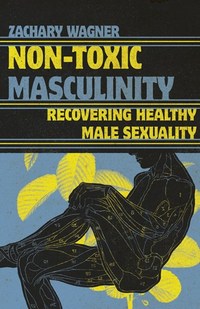 Non-Toxic Masculinity:
Non-Toxic Masculinity:
Recovering Healthy Male Sexuality
DETAILS: Publisher: IVP Publication Date: April 04, 2023 Format: Paperback Length: 194 pg. Read Date: April 23-May 7, 2023

What’s Non-Toxic Masculinity About?
This is one of those books where I could easily go on and on about the arguments and ideas presented within—and I’d like to interact with some of those a bit, too. But this isn’t the place for that—I have to remind myself again—I’ll touch on some of it, but not much.
Wagner starts by reflecting on the Purity Culture that blossomed in the 90s (and since) in Evangelicalism and Conservative Protestantism—and the not-helpful to harmful ways it has impacted the lives of men and women since then. This first part of the book defines the issues and what kind of damage they have wrought.
The next two parts look to define and construct a healthy, i.e., non-toxic mascultinity, based on a Biblical view of masculinity—redeemed masculinity to be precise. After laying out this vision, he suggests ways to implement this vision. Wagner’s idea is rooted in sanctification—not to the exclusion of other areas, but that’s not what this book is about. His view of a sanctified, or at least growing in sanctification, masculinity is not that found in the Purity Culture or some of the works around it, but something greater.
Problems with the Book
I don’t have a lot to quibble with here—my main problem is that I think too much of this book is Zachary Wagner’s story. I think it has its place in this book—and it’s important to see what got him headed down this path of investigation. But I think we got too much about him.
I can easily see other readers disagreeing with me—and perhaps seeing themselves in him and his struggles. At the very least being able to relate to them and appreciating him sharing those struggles—and how he’s come through them. And I do, too. I just think we could use 15-30% less of it.
Similarly, I do wonder if he made the same points too many times in general—maybe accented differently depending on the chapter, but on more than one occasion I wondered “didn’t he already make this point in the last chapter?” Even there, that’s something I wonder with about half the non-fiction works I read anymore, so Wagner’s just fitting in.
An Unexpected Feature
Running throughout the book, but found in a couple of places in particular, is a critique of the more problematic aspects of Every Man’s Battle, the influential work by Stephen Arterburn and Fred Stoeker.
Now, true, the book has become a whipping boy for several authors recently—but I think it’s largely deserved.
Wagner, like me, once swallowed the book and its vision of male sexuality—redeemed or not. But, Wagner argues (convincingly, I’d say) that Every Man’s Battle‘s vision sees all men as permanently adolescent, immature, and lacking any kind of self-control. But if you read Paul, he’s clear that this is not what a mature Christian should be—absolutely, no Christian will reach full maturity in this life—but if you have no more self-control as an adult as you did as a teenager, you’re missing something vital in your spiritual (as well as physical and mental) life.
That’s, of course, a very brief summary of Wagner—his critique is more thorough (and more convincing). Now, is that what I got the book for? No. Did I expect something like that? Also, no. Am I glad Wagner gave it? Yes.
So, what did I think about Non-Toxic Masculinity?
The last chapter, “Death and Resurrection: The Beauty of Redeemed Masculinity,” is a winner. It sums up everything he’s been arguing for in the whole book and then focuses it. Wagner reminds the reader that Christianity is a call to self-denial, self-sacrifice, and dying to self. This includes in the bedroom. If you haven’t been convinced before this point, you likely won’t be by this chapter, but I found the terms he framed in this last chapter in the most convicting. I’d suggest that readers who don’t agree might have missed something. Those chapters leading up to it, are almost as good, too.
Ultimately what Wagner delivers is what I wanted in last year’s How Not to Be an *SS—and then some. So just on those terms, I’m a satisfied reader. But he delivered more than just that—laying out a compelling positive case for a masculinity defined by Scriptural terms, not merely cultural—whether in lock-step with it or in reaction against it.
I can’t—and wouldn’t want to—sign off on every jot and tittle of the work. But it’s far superior to every other thing I’ve read on the subject of what it means to be a man, male sexuality, and ideas of that nature, that I’m tempted to. (although Keith Ronald Gregoire and Andrew Bauman aren’t that far off)
No matter where you fit on the spectrum of those reacting to the purity culture, it’s worth a read. It’s good to consider, and helpful to sharpen your iron.

This post contains an affiliate link. If you purchase from it, I will get a small commission at no additional cost to you. As always, the opinions expressed are my own.
![]()



Read Irresponsibly, but please Comment Responsibly